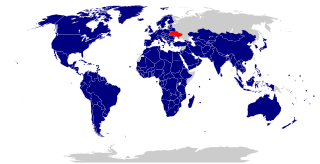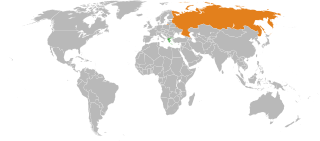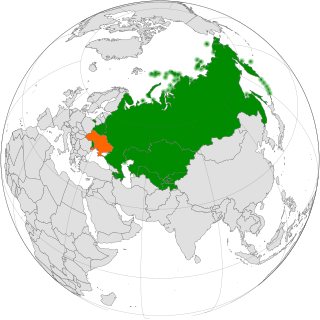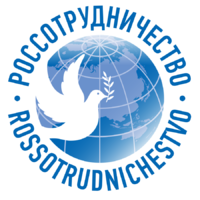
Foreign relations of Kazakhstan are primarily based on economic and political security consideration. The Nazarbayev administration has tried to balance relations with Russia and the United States by sending petroleum and natural gas to its northern neighbor at artificially low prices while assisting the U.S. in the War on Terror. Kazakhstan is a member of the United Nations, Collective Security Treaty Organization, Organization for Security and Co-operation in Europe, North Atlantic Cooperation Council, Commonwealth of Independent States, the Shanghai Cooperation Organisation, and NATO's Partnership for Peace program. Kazakhstan established a customs union with Russia and Belarus which eventually became the Eurasian Economic Union. President Nazarbayev has prioritized economic diplomacy into Kazakhstan's foreign policy.

The foreign relations of the Russian Federation is the policy arm of the government of Russia which guides its interactions with other nations, their citizens, and foreign organizations. This article covers the foreign policy of the Russian Federation since the dissolution of the Soviet Union in late 1991. At present, Russia has no diplomatic relations with Ukraine due to its ongoing invasion of Ukraine. Other than Ukraine, Russia also has no diplomatic relations with Georgia, Bhutan, Federated States of Micronesia or Solomon Islands.

Ukraine has formal relations with many nations and in recent decades has been establishing diplomatic relations with an expanding circle of nations. The foreign relations of Ukraine are guided by a number of key priorities outlined in the foreign policy of Ukraine.

The Federal Security Service of the Russian Federation is the principal security agency of Russia and the main successor agency to the Soviet Union's KGB; its immediate predecessor was the Federal Counterintelligence Service (FSK) which was reorganized into the FSB in 1995. The three major structural successor components of the former KGB that remain administratively independent of the FSB are the Foreign Intelligence Service (SVR), the Federal Protective Service (FSO), and the Main Directorate of Special Programs of the President of the Russian Federation (GUSP).

Farit Mubarakshevich Mukhametshin is a Russian politician and diplomat. He has served as a member of the Federation Council of the Federal Assembly as the representative of Samara Oblast since 2018. He has previously been head of the Federal Agency for the Commonwealth of Independent States Affairs, Compatriots Living Abroad, and International Humanitarian Cooperation (Rossotrudnichestvo), and as ambassador of Russia to Moldova, and to Uzbekistan.

RT is a Russian state-controlled international news television network funded by the Russian government. It operates pay television and free-to-air channels directed to audiences outside of Russia, as well as providing Internet content in Russian, English, Spanish, French, German and Arabic.

The Federal Service for Supervision of Communications, Information Technology and Mass Media, abbreviated as Roskomnadzor (RKN), is the Russian federal executive agency responsible for monitoring, controlling and censoring Russian mass media. Its areas of responsibility include electronic media, mass communications, information technology and telecommunications, supervising compliance with the law, protecting the confidentiality of personal data being processed, and organizing the work of the radio-frequency service.

Television, magazines, and newspapers have all been operated by both state-owned and for-profit corporations which depend on advertising, subscription, and other sales-related revenues. Even though the Constitution of Russia guarantees freedom of speech, the press has been plagued by both government censorship and self-censorship.

Greco-Russian relations are the bilateral foreign relations between Greece and Russia. The two countries first entered into diplomatic relations in 1828. Both Greece and Russia are members of international organizations and agreements, including the United Nations, Organization for Security and Cooperation in Europe, and the Organization of the Black Sea Economic Cooperation.

South Korea–Ukraine relations are foreign relations between South Korea and Ukraine. Diplomatic Relations were established on February 10, 1992. South Korea has an embassy in Kyiv. Ukraine has an embassy in Seoul.

Serbia–Ukraine relations are foreign relations between Serbia and Ukraine. Serbia, as a direct successor to the Federal Republic of Yugoslavia, recognized Ukraine on 15 April 1994. Diplomatic relations between Ukraine and the Federal Republic of Yugoslavia were established on 15 April 1994.
Media portrayals of the Russo-Ukrainian War, including skirmishes in eastern Donbas and the 2014 Ukrainian revolution after the Euromaidan protests, the subsequent 2014 annexation of Crimea, incursions into Donbas, and the full-scale invasion of Ukraine in 2022, have differed widely between Ukrainian, Western and Russian media. Russian, Ukrainian, and Western media have all, to various degrees, been accused of propagandizing, and of waging an information war.

Konstantin Iosifovich Kosachev is a Russian politician and former diplomat. He is a senator at the Federation Council and chairs its Foreign Affairs Committee. He has been on the US sanctions list since 2018.

Yevgeny Alexandrovich Primakov is a Russian journalist, TV host, politician and diplomat serving as Head of the Federal Agency for the Commonwealth of Independent States, Compatriots Living Abroad and International Humanitarian Cooperation since 25 June 2020. He previously was the Member of the State Duma from 2018 to 2020. In the media, he is known by the pseudonym Yevgeny Sandro.

From April 2014 until September 2022, the Donetsk People's Republic (DPR) and the Luhansk People's Republic (LPR) claimed to be independent states. Their sovereignty was recognised by South Ossetian authorities in 2014, Russia and Abkhazian authorities in February 2022, Syria in June 2022 and North Korea in July 2022.

The Russian information war against Ukraine was articulated by the Russian government as part of the Gerasimov doctrine. They believed that Western governments were instigating color revolutions in former Soviet states which posed a threat to Russia.
"What Russia Should Do with Ukraine", is an article written by Timofey Sergeytsev and published by the Russian state-owned news agency RIA Novosti. The article calls for the full destruction of Ukraine as a state, as well as the full destruction of the Ukrainian national identity in accordance with Russia's aim to accomplish the "denazification" of the latter. The article contrasts the views that Russian president Vladimir Putin expressed in the speech announcing the invasion, where he stated there were no plans to occupy Ukraine, and the Ukrainian people's right to self-determination would not be infringed upon.

Ukraine Recovery Conference is an annual international event dedicated to discussions on the rebuilding and reconstruction priorities of Ukraine due to the Russian invasion of Ukraine.

Relations between Ukraine and the Commonwealth of Independent States (CIS) are multilateral international relations between a third state and a supranational organization.


















